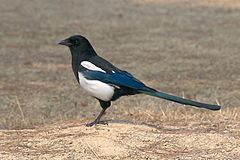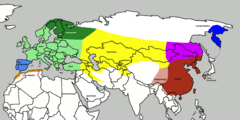Korean magpie facts for kids
Quick facts for kids Korean magpie |
|
|---|---|
 |
|
| Korean magpie | |
| Scientific classification | |
| Kingdom: | |
| Class: | |
| Order: | |
| Family: | |
| Genus: | |
| Species: |
Pica pica
|
| Trinomial name | |
| Pica (pica) sericea Gould, 1845
|
|
 |
|
| Dark red/orange/brown-grey: P. (p.) sericea range Red: P. (p./s.) bottanensis range |
|
The Korean magpie (Pica (pica) sericea) is a type of magpie found in East Asia. It's a very important bird in Korea. Many cities and areas in South Korea have even chosen it as their official bird!
This magpie looks a lot like the European magpie. However, it has a shorter tail and longer wings. Its feathers are mostly black and purple, with very little green. The Korean magpie makes a chattering sound, just like European magpies, but its call is much softer.
Myths and Meanings of Magpies
Magpies have a special place in Korean culture. People in Korea used to believe that magpies brought good news. If they heard a magpie chattering, they thought visitors were coming soon!
One famous painting shows a magpie chirping to a striped tiger. This painting is called "ggach'i wha horangi minhwa." In this artwork, the magpie stands for good news. The tiger represents good luck, partly because its name in Chinese sounds similar to the word for good luck. Many old Korean stories also feature magpies.
In China, magpies were sometimes called "Birds of Joy" or "Happy Magpies." During the Manchu dynasty, they even symbolized imperial rule. Some Manchu people in Northeast China believed magpies were gods. In Western cultures, however, magpies were sometimes seen as a symbol of pride.
See also
 In Spanish: Urraca oriental para niños
In Spanish: Urraca oriental para niños
 | Victor J. Glover |
 | Yvonne Cagle |
 | Jeanette Epps |
 | Bernard A. Harris Jr. |

